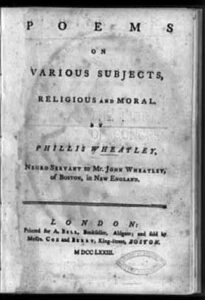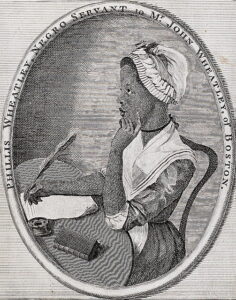“On Being Brought from Africa” — Phillis Wheatley (1773)
Jake Sokolofsky
In the words of Phillis Wheatley, “in every human breast, God has implanted a principle, which we call love of freedom; it is impatient of oppression, and pants for deliverance” [1]. Wheatley was a Black female poet in the Revolutionary United States widely recognized for her intellect, literary prowess, and anti-slavery message. Enslaved at age seven, Wheatley grew up in Boston in the mid-1700s with a family who nurtured her intellectual curiosity and in part contributed to her later success [2]. Though creating poems denouncing racism and commenting on the hypocrisy of American Christianity, Wheatley gained public prominence in the late 1760s and early 1770s before finally being freed in 1774 shortly after publishing her first book of poems, Poems on Various Subjects, Religious and Moral [3]. Part of the larger collection was Wheatley’s “On Being Brought from Africa,” a poem deconstructing racism and slavery disguised in diplomatic and passive rhetoric. Through specific rhetorical style and progress, Wheatley made a distinct case for the injustice of slavery by drawing on Christianity and foundational American values, thus using the tools of oppression as a tool for liberation.
The progression of Wheatley’s poetic strategy, just like her impeccable word choice, was carefully crafted to amplify the critical sting of her final underlying meaning and message. In a diplomatic posture, Wheatley wrote in the first two lines:
Twas mercy brought me from my Pagan land
Taught my benighted soul to understand [4]
Her utilization of the words “mercy” and “benighted” at the beginning of the poem emphasize the juxtaposed position of the White and Black man in the White man’s mind, with Black people requiring the Whites’ help to bring them out of their moral and intellectual darkness (benightedness). The next line considered the same fact, particularly regarding the italicization of the word “Pagan” and “Saviour” in lines 1 and 3, respectively. Wheatley’s apparent “gratefulness” for slavery insofar as it conferred Christianity upon her is highlighted by the duality between Pagan (those who must be saved: Black people) and the Saviour (those doing the saving: White people). In lines 3-4, Wheatley wrote:
That there’s a God, that there’s a Saviour too:
Once I redemption neither sought nor knew.
Her distinction between “God” and “Saviour” therefore served a deeper purpose: she distinguished between the force of “God,” an ultimate being operating outside of the norms of inequality and the constructions of man, and the “Saviour,” who in the Christian faith enters into the realm of man and acts upon humans. In this way, “God” for Wheatley served as the force behind her later exposition and critique of racial inequality, though not the only force at play. In the same way that her later italicization of “Christians” employed sarcasm and authority over religion as a method of critique, “Saviour” marked a transition away from her initial “gratefulness” for slavery: gratefulness serving only to soften the minds of readers to accept her true critique.
Her critique transitioned into fullness as she exposed the racism of the White man:
Some view our sable race with scornful eye,
“Their colour is a diabolic die.”
Again, Wheatley drew on White Christianity to make her point: “diabolic” emphasizes the “devilishness” of the black skin color, implicitly juxtaposing it with the purity and sanctity of the White race. Itself a reference to the social construction of race, the argument falls back on principles of equality and universality which challenged the foundations of her society. Wheatley again referenced a prior allusion to benightedness as a reclamation from “evil” and “sin,” contributing to her explicit condemnation of Christian and American hypocrisy in the next lines:
Remember, Christians, Negros, black as Cain,
May be refin’d, and join th’ angelic train.
Her use of italics in the line, “Remember, Christians, Negros, black as Cain,” emphasized the similarities between popularly incompatible terms: Christians to Negroes and Cain. The allusions to evil and devilishness culminate in Cain, one of the ultimate evils of the Bible, and displayed White racism through the connection to Blackness. In addition, the use of italics on “Christians” created a tone of authority, lecturing Christians about what the Bible entails following her distinction between God and Saviour earlier in the poem. The burgeoning critique manifested fully in the last two lines, effectively concluding her strategy of an attack first disguised as grateful emotion but revealed as sarcastic indictment.
Wheatley’s “On Being Brought From Africa” does more than merely the title would suggest. Drawing on the ideas of White saviorhood and Christianity, Wheatley made a profound critique of slavery’s hypocrisy yet dialectically emphasized how that system produced her own consciousness. In this way, though describing the most sinister of human activities, Wheatley made a compelling case for hope in the face of it: systems such as slavery produce people like her willing to stand up and turn the tools of their oppressors against them, a revolutionary potential that could lead to radical change.
Citations
[1] Phillis Wheatley to Reverand Samson Occom, March 11, 1774, in Becoming America: An Exploration of American Literature from Precolonial to Post-Revolution, ed. Wendy Kurant (University of North Georgia, 2019), 579.
[2] Mosvick, Nicholas. “Forgotten Founders: Phillis Wheatley, African-American Poet of the Revolution.” National Constitution Center, February 17, 2022. [WEB].
[3] “Phillis Wheatley’s Poem on Tyranny and Slavery, 1772.” The Gilder Lehrman Institute of American History. [WEB].
[4] Wheatley, Phillis. “On Being Brought from Africa.” Poems on Various Subjects, Religious and Moral, 1773.

